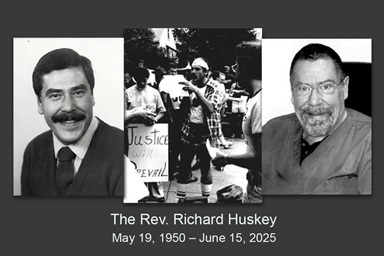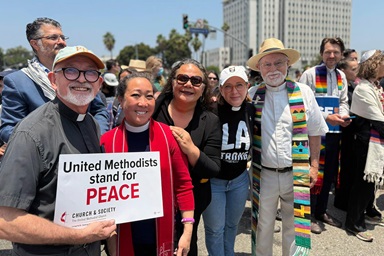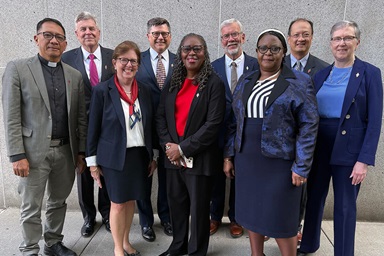The United Methodist Judicial Council is likely to consider the effects of improper voting on legislation that allows churches to leave the denomination.
An amended request from the Council of Bishops now asks the denomination’s top court to consider the implications of the General Conference Commission’s finding that four ineligible voters cast a ballot during votes on that disaffiliation legislation.
That request is part of the 18-item docket when the Judicial Council meets Oct. 29-Nov.1 in Evanston, Illinois.
The action by delegates at General Conference 2019 last February added a new paragraph, 2553, on “Disaffiliation of Local Churches Over Issues Related to Human Sexuality” in the Book of Discipline, the church’s lawbook. The adopted legislation allows, with limitations, congregations to leave the denomination while keeping church property.
In August, the Commission on General Conference determined enough improper voting likely took place at the 2019 special session in St. Louis to nullify that action. By a two-vote margin, 402-400, the delegates substituted a minority report for Petition 90066, the originally submitted disaffiliation legislation.
During a closed-door meeting, the commission reviewed an investigation that found “credible objective evidence” of four ineligible people casting votes using the credentials of delegates who were not present. The commission later asked the bishops to refer the matter to the Judicial Council.
In its original request on the issue of church disaffiliation, the Council of Bishops asked for a “declaratory decision as to the constitutionality, meaning, application and effect of Paragraph 2553” as it relates to the effective date of the legislation.
In the motion “to amend and supplement” the request, the bishops included the fact that the vote substituting the minority report on Petition 90066 — passed by two votes — was determined by the Commission on General Council “to be tainted by illegal voting and is therefore null and void.” The substituted and edited petition, the request noted, was adopted by a vote of 420-390.
The amended requests now also asks what is the effect of the commission’s determination “that the vote to substitute the minority report related to Petition 90066 is null and void?”
The other item from the Council of Bishops on the October court docket concerns the major piece of legislation passed at GC2019.
The bishops request a declaratory decision on “the constitutionality, meaning, application and effect of certain petitions adopted as the Traditional Plan,” specifically asking five questions about the effects of the plan “that need to be addressed for the benefit of The United Methodist Church.”
In brief, those detailed questions about specific aspects of the Traditional Plan relate to the following issues:
• Whether the expanded definition of self-avowed practicing homosexual in Paragraph 304.3 (Petition 90032) applies to those already ordained under previous definitions of that term and, if not, whether the definition would violate the principle of legality.
• How the expanded definition of self-avowed practicing homosexual might be unconstitutional because it does not allow for the presumption that a person is "practicing" to be rebutted.
• Whether a certification requirement for ordination is unconstitutional because it was ruled so in two recent Judicial Council decisions.
• Under what circumstances the binding civil law in an annual conference could affect whether a person could be found guilty of a chargeable offence or assessed a mandatory suspension of pay.
• If such penalties could not be imposed because of civil law, whether that part of Paragraph 2711.3 would then violate the principle of legality because it could not be applied equally.
Subscribe to our
e-newsletter
Like what you're reading and want to see more? Sign up for our free daily and weekly digests of important news and events in the life of The United Methodist Church.
The hearings are open to the public. The hearing for Docket 3, the petition regarding the Traditional Plan is at 9:30 a.m., while the hearing for Docket 4, the petition on the disaffiliation legislation, is at 11 a.m. There is a half-hour break between the two oral hearing sessions. No livestream of the hearings will be available.
In other business, 11 docket items are automatic reviews by the church court of decisions of law made by nine bishops during the 2019 annual conference season. Most of those also relate to the Traditional Plan. Another four requests for a decision by the top court came directly from annual conference voters.
In a related disaffiliation issue, the Alaska Conference wants to know whether the option of withdrawing from the denomination as an annual or missionary conference is provided for in the 2016 Book of Discipline or by previous Judicial Council decisions.
Decisions from the October Judicial Council meeting will not be made public until sometime after the meeting adjourns at lunchtime on Nov. 1.
Bloom is the assistant news editor for United Methodist News Service and is based in New York.
Follow her at https://twitter.com/umcscribe or contact her at 615-742-5470 or [email protected]. To read more United Methodist news, subscribe to the free daily or weekly digests.
Like what you're reading? Support the ministry of UM News! Your support ensures the latest denominational news, dynamic stories and informative articles will continue to connect our global community. Make a tax-deductible donation at ResourceUMC.org/GiveUMCom.




